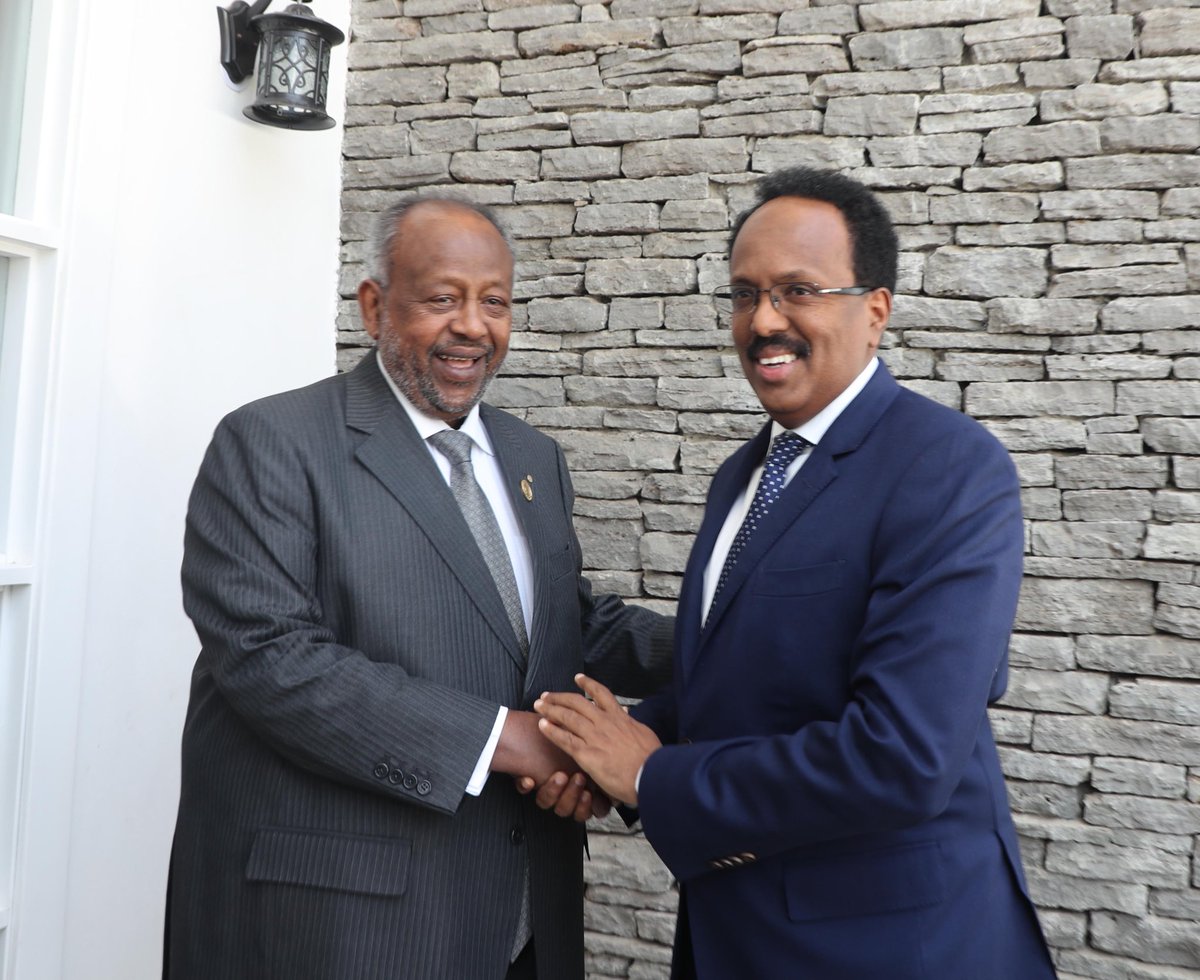Dr. Abiy Ahmed, Prime Minister of Ethiopia, it was reported, had dual objectives behind the invitation he extended to the President of the Republic of Somaliland, H.E. Musa Bihi Abdi.
The Prime Minister, reliable sources revealed, wished to bring the two Presidents of Somaliland and Somalia, Musa Bihi, and Mohamed Abdullahi ‘Farmajo’, face-to-face in Addis Ababa.
The PM informed both presidents of his intention – bit not the world. Both of them, categorically, accepted.
Musa Bihi flew to Addis Ababa on Wednesday, and Farmajo flew from Bujumbura, Burundi, on Tuesday to stay overnight in Djibouti ion his way to Addis Ababa.
In between Tuesday and Wednesday, Farmajo changed his mind and, after a brief meeting with the President of Djibouti, Ismail Omar Ghuelleh, flew home to Mogadishu.
The PM and President Bihi were left to hold the sack alone. They settled, instead, on a meeting that was pushed forward from its scheduled slot on Thursday.
During the meeting, Prime Minister, spoke of his wish that the two sides of Somalia and Somaliland bring down tempers to a level that they can talk without rancor in order to chart out mutually, beneficial issues.
Why Skip
There are two theories.
The more plausible of the two is based on Somaliland’s insistence that it can only resume talks with Somalia at the presence of strong, influential members of the international community, especially AU and EU members.
Somaliland, understandably, was apprehensive of wasting more time on meetings whose signed outcome would sooner or later be unilaterally rescinded by an insincere Somalia side.
Somaliland made its desire to see Ethiopia present at the negotiating table known to relevant ears.
At the schedule meeting in Addis Ababa, PM Abiy Ahmed wished to secure the acceptance of Farmajo of Ethiopia as a witness to the talks.
Farmajo, on the other hand, wishing to keep Turkey present alone at the talks, had no wish to bring on more witnesses to the table.
Coming to know that this issue was to be raised at the meeting with Bihi, Farmajo decided to skip the whole visit and hop hop over home hurriedly.
President Bihi, not ditching Turkey altogether, told its envoy, Dr. Olgan Bekar, however, that Somaliland wished to bring other international actors to the negotiating table as witnesses – and moderators if need be. President Bihi outlined the extent to which Turkey went to build Somalia, and equip and train its military fully well knowing its blind fury against anything developmental happening in Somaliland.
“Balance your attention to the two countries, first,” President Bihi told the envoy.
Turkey has built the largest foreign, military base in Africa in Mogadishu. It also trains the different disciplines of the Somalia military forces – air, land and naval – at the base and abroad.
Besides, Turkey has built innumerable educational and health facilities in Mogadishu. It spent millions more on roads, the airport and the sea port, too.
Not a fraction of a millionth of that aid reached Somaliland. One reason Somaliland cannot trust Turkey alone as a chaperone.
READ ALSO: Somaliland Talks With Somali Only In Front Of More Than Turkey
Another team believes that President Omar Ghuelleh alarmed by a possible regional that that may not ultimately work to his advantage changed Farmajo’s mind.
The latter group alleges that Djibouti, despite the tremendous loss of life the people of Somaliland selflessly sacrificed in order for Djibouti to get independent, Djibouti did never reciprocate, and especially during Somaliland’s hour of need, Instead, Djibouti, one of the five Somali areas that the 1960 union anticipated.
Djibouti, enormously inflated by its new-founded regional importance, sees Somaliland as a potential Red Sea rival.
In Somalia, Djibouti sees a baby it had single-handedly helped brought to world attention – an attention that is still keeping it alive.
Whichever the reason is, Somalia has gambled on its relations with Ethiopia. Time will tell how this will affect its future with one of its major ‘protectors’.





























